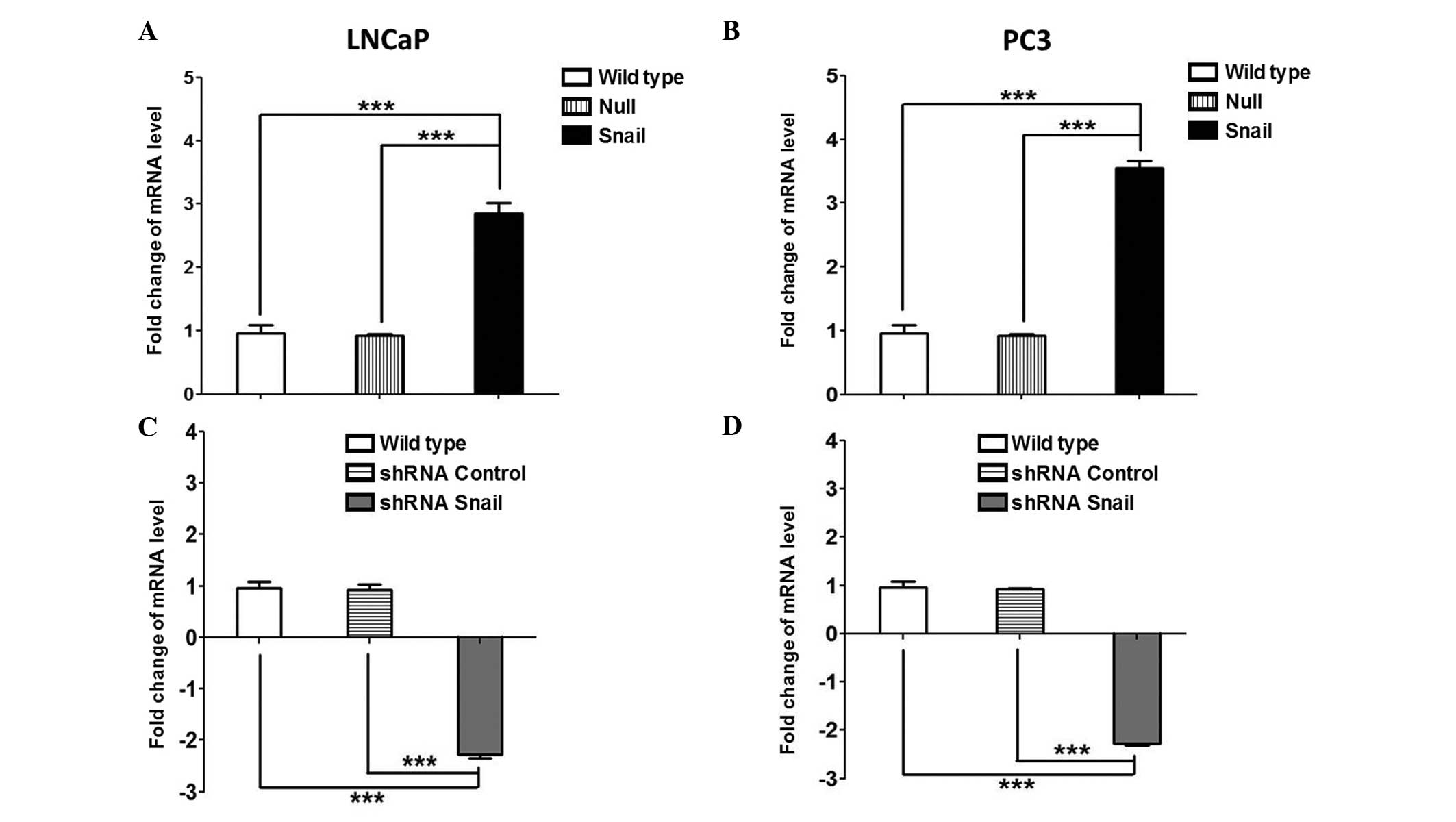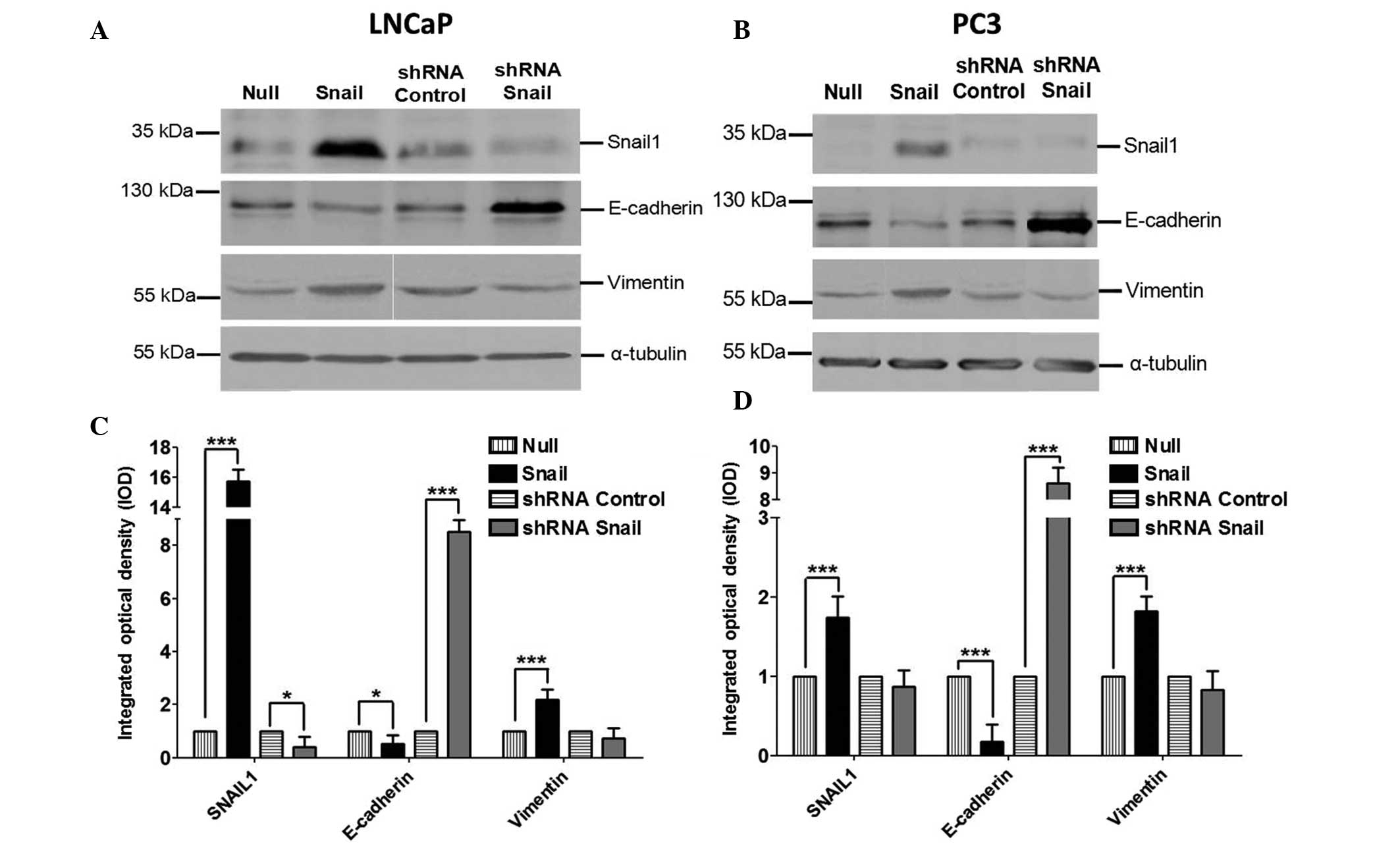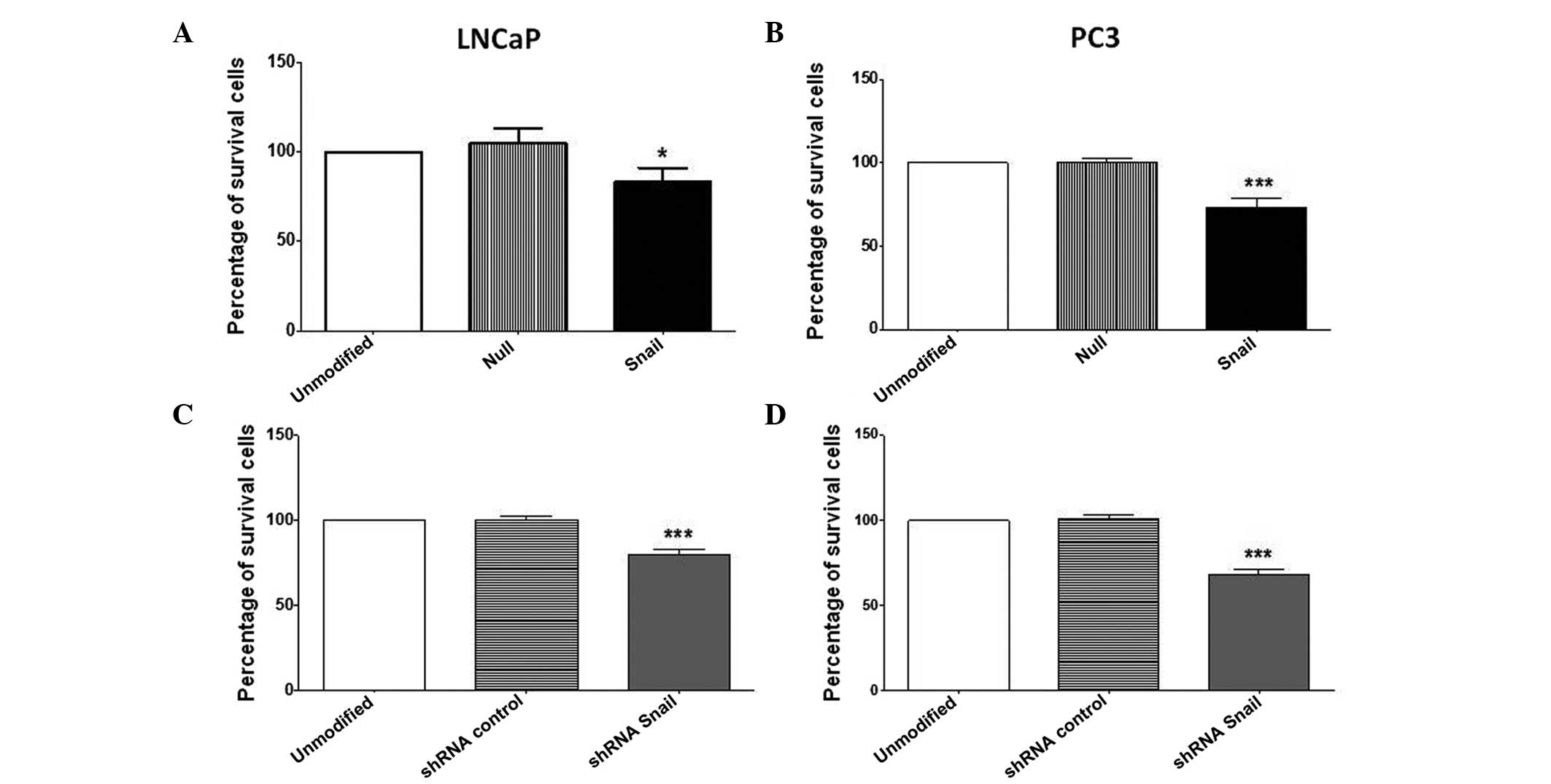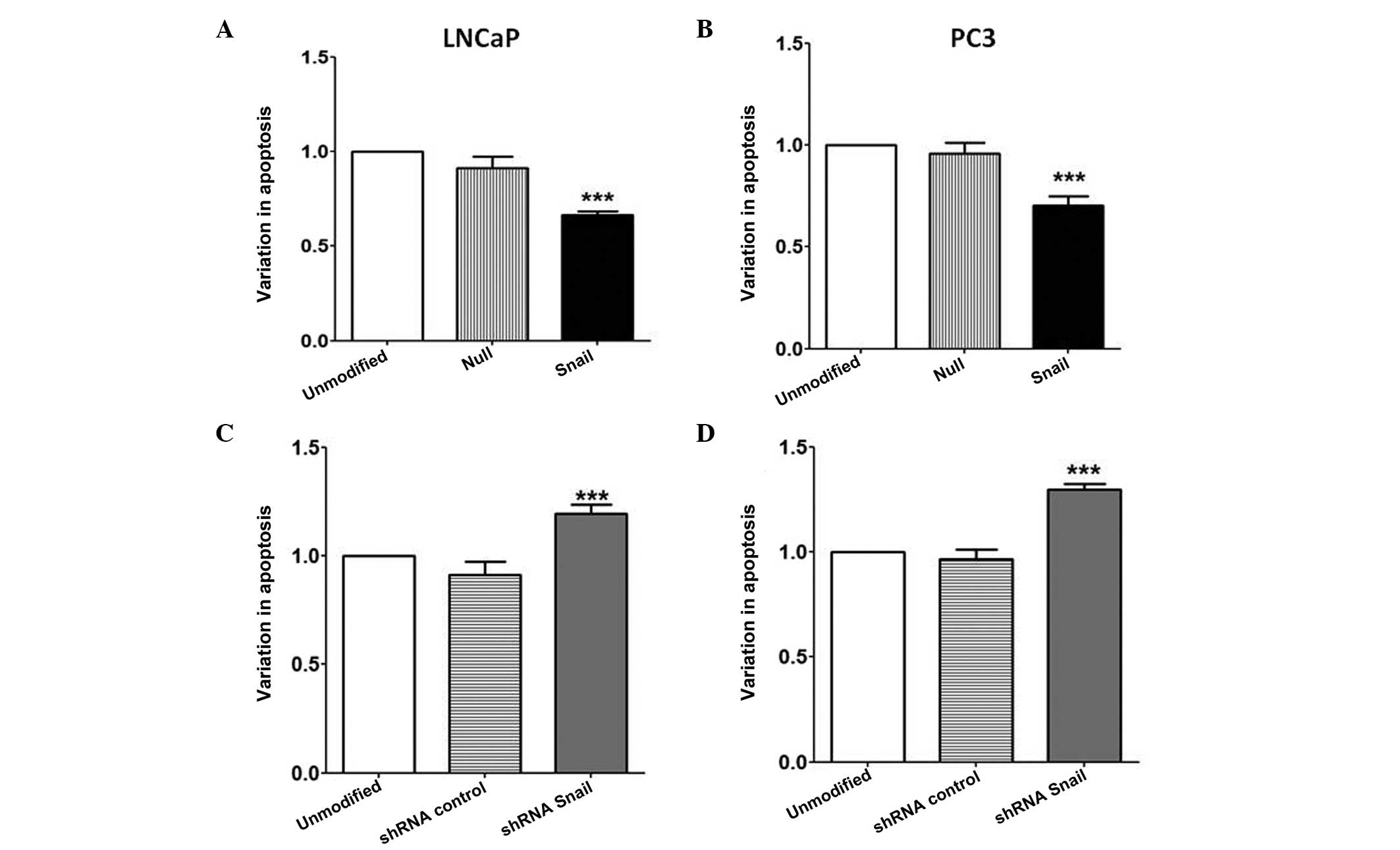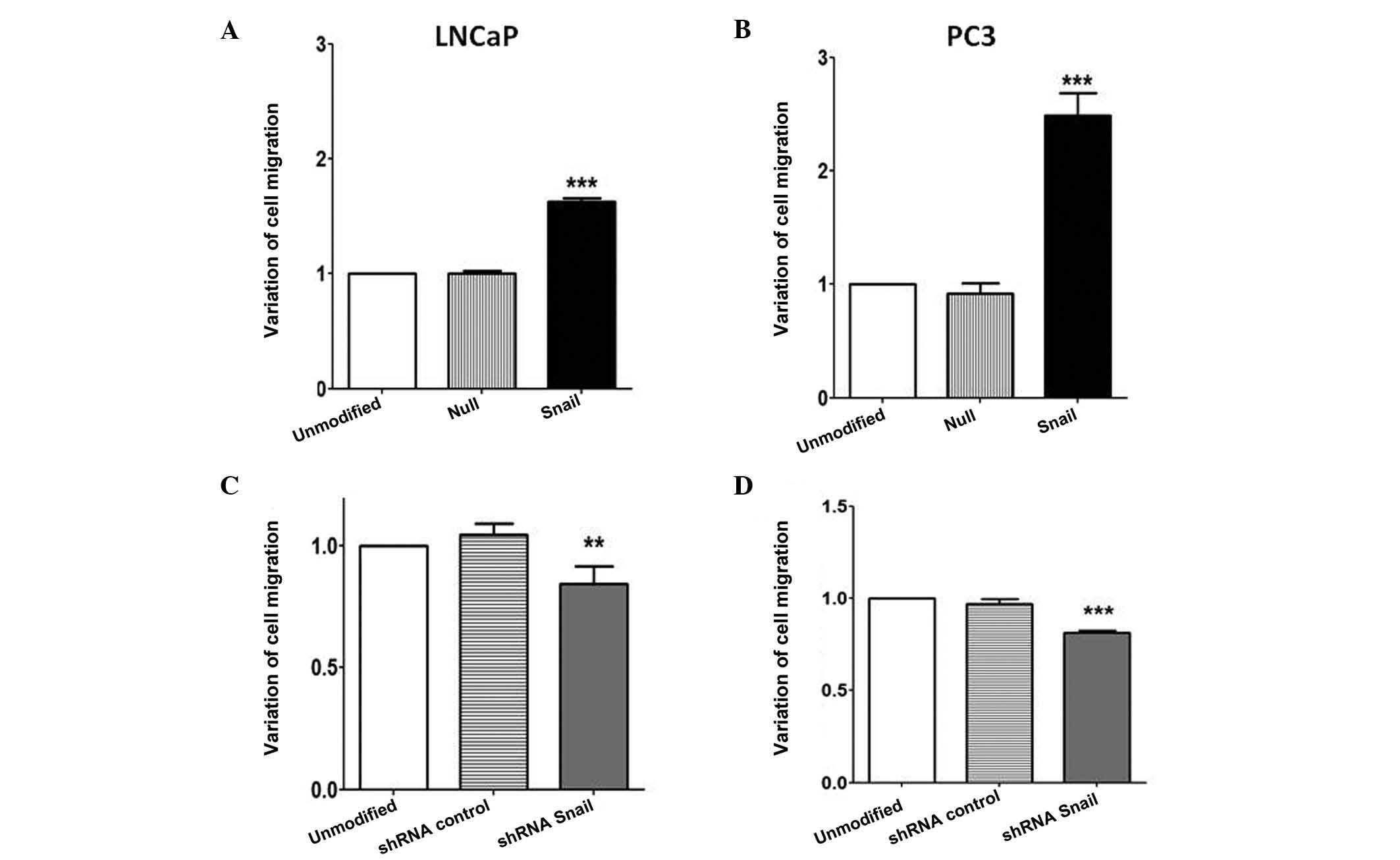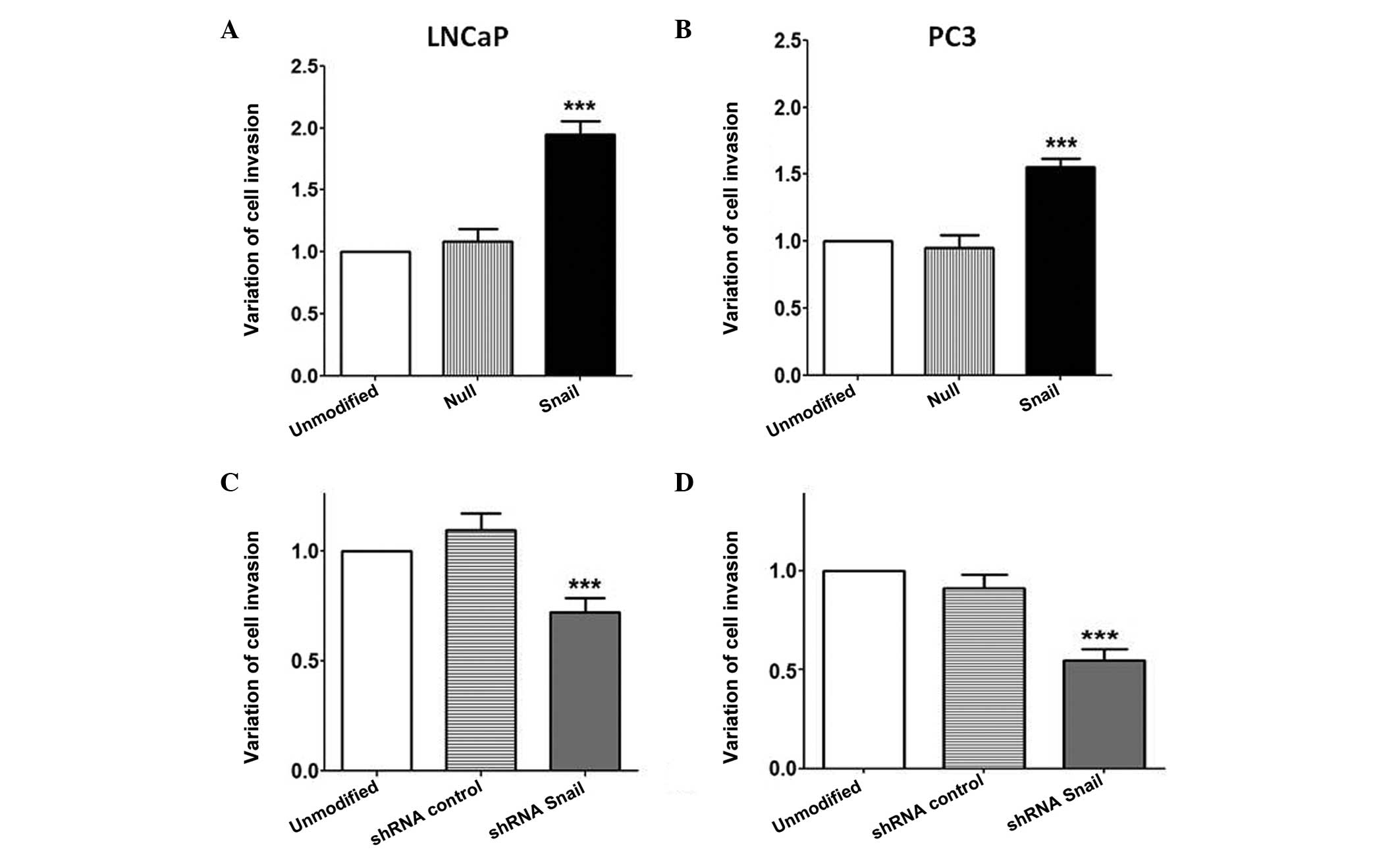|
1
|
Shen MM and Abate-Shen C: Molecular
genetics of prostate cancer: New prospects for old challenges.
Genes Dev. 24:1967–2000. 2010. View Article : Google Scholar : PubMed/NCBI
|
|
2
|
De Marzo AM, Platz EA, Sutcliffe S, Xu J,
Grönberg H, Drake CG, Nakai Y, Isaacs WB and Nelson WG:
Inflammation in prostate carcinogenesis. Nat Rev Cancer. 7:256–269.
2007. View
Article : Google Scholar : PubMed/NCBI
|
|
3
|
De Marzo AM, Nelson WG, Isaacs WB and
Epstein JI: Pathological and molecular aspects of prostate cancer.
Lancet. 361:955–964. 2003. View Article : Google Scholar
|
|
4
|
Kalluri R and Weinberg RA: The basics of
epithelial-mesenchymal transition. J Clin Invest. 119:1420–1428.
2009. View
Article : Google Scholar : PubMed/NCBI
|
|
5
|
Nauseef JT and Henry MD:
Epithelial-to-mesenchymal transition in prostate cancer: Paradigm
or puzzle? Nat Rev Urol. 8:428–439. 2011. View Article : Google Scholar : PubMed/NCBI
|
|
6
|
Gavert N and Ben-Ze'ev A:
Epithelial-mesenchymal transition and the invasive potential of
tumors. Trends Mol Med. 14:199–209. 2008. View Article : Google Scholar : PubMed/NCBI
|
|
7
|
Thiery JP: Epithelial-mesenchymal
transitions in tumour progression. Nat Rev Cancer. 2:442–454. 2002.
View Article : Google Scholar : PubMed/NCBI
|
|
8
|
Thiery JP, Acloque H, Huang RY and Nieto
MA: Epithelial-mesenchymal transitions in development and disease.
Cell. 139:871–90. 2009. View Article : Google Scholar : PubMed/NCBI
|
|
9
|
Tse JC and Kalluri R: Mechanisms of
metastasis: Epithelial-to-mesenchymal transition and contribution
of tumor microenvironment. J Cell Biochem. 101:816–829. 2007.
View Article : Google Scholar : PubMed/NCBI
|
|
10
|
Armstrong AJ, Marengo MS, Oltean S, Kemeny
G, Bitting RL, Turnbull JD, Herold CI, Marcom PK, George DJ and
Garcia-Blanco MA: Circulating tumor cells from patients with
advanced prostate and breast cancer display both epithelial and
mesenchymal markers. Mol Cancer Res. 9:997–1007. 2011. View Article : Google Scholar : PubMed/NCBI
|
|
11
|
Chao Y, Wu Q, Acquafondata M, Dhir R and
Wells A: Partial mesenchymal to epithelial reverting transition in
breast and prostate cancer metastases. Cancer Microenviron.
5:19–28. 2012. View Article : Google Scholar :
|
|
12
|
Dhanasekaran SM, Barrette TR, Ghosh D,
Shah R, Varambally S, Kurachi K, Pienta KJ, Rubin MA and Chinnaiyan
AM: Delineation of prognostic biomarkers in prostate cáncer.
Nature. 412:822–826. 2001. View
Article : Google Scholar : PubMed/NCBI
|
|
13
|
Beach S, Tang H, Park S, Dhillon AS,
Keller ET, Kolch W and Yeung KC: Snail is a repressor of RKIP
transcription in metastatic prostate cancer cells. Oncogene.
27:2243–2248. 2008. View Article : Google Scholar
|
|
14
|
Odero-Marah VA, Wang R, Chu G, Zayzafoon
M, Xu J, Shi C, Marshall FF, Zhau HE and Chung LW: Receptor
activator of NF-kappaB Ligand (RANKL) expression is associated with
epithelial to mesenchymal transition in human prostate cancer
cells. Cell Res. 18:858–870. 2008. View Article : Google Scholar : PubMed/NCBI
|
|
15
|
Heebøll S, Borre M, Ottosen PD, Dyrskjøt
L, Orntoft TF and Tørring N: Snail1 is over-expressed in prostate
cancer. APMIS. 117:196–204. 2009. View Article : Google Scholar : PubMed/NCBI
|
|
16
|
Neal CL, Henderson V, Smith BN, McKeithen
D, Graham T, Vo BT and Odero-Marah VA: Snail transcription factor
negatively regulates maspin tumor suppressor in human prostate
cancer cells. BMC Cancer. 12:3362012. View Article : Google Scholar : PubMed/NCBI
|
|
17
|
Poblete CE, Fulla J, Gallardo M, Muñoz V,
Castellón EA, Gallegos I and Contreras HR: Increased SNAIL
expression and low syndecan levels are associated with high Gleason
grade in prostate cancer. Int J Oncol. 44:647–654. 2012.
|
|
18
|
Liu J, Uygur B, Zhang Z, Shao L, Romero D,
Vary C, Ding Q and Wu WS: Slug inhibits proliferation of human
prostate cancer cells via downregulation of cyclin D1 expression.
Prostate. 70:1768–1777. 2010.PubMed/NCBI
|
|
19
|
Livak KJ and Schmittgen TD: Analysis of
relative gene expression data using real-time quantitative PCR and
the 2−ΔΔCt method. Methods. 25:402–408. 2001. View Article : Google Scholar
|
|
20
|
Li H, Li M, Xu D, Zhao C, Liu G and Wang
F: Overexpression of Snail in retinal pigment epithelial triggered
epithelial-mesenchymal transition. Biochem Biophys Res Commun.
446:347–351. 2014. View Article : Google Scholar : PubMed/NCBI
|
|
21
|
Olmeda D, Jordá M, Peinado H, Fabra A and
Cano A: Snail silencing effectively suppresses tumour growth and
invasiveness. Oncogene. 26:1862–1874. 2007. View Article : Google Scholar
|
|
22
|
Díaz-López A, Díaz-Martinez A,
Moreno-Bueno G, Cuevas EP, Santos V, Olmeda D, Portillo F, Palacios
J and Cano A: Zeb1 and Snail1 engage miR-200f transcriptional and
epigenetic regulation during EMT. Int J Cancer. 136:E62–E73. 2015.
View Article : Google Scholar
|
|
23
|
Cano A, Pérez-Moreno MA, Rodrigo I,
Locascio A, Blanco MJ, del Barrio MG, Portillo F and Nieto MA: The
transcription factor snail controls epithelial-mesenchymal
transitions by repressing E-cadherin expression. Nat Cell Biol.
2:76–83. 2002. View
Article : Google Scholar
|
|
24
|
Zeisberg M and Neilson EG: Biomarkers for
epithelial-mesenchymal transitions. J Clin Invest. 119:1429–1437.
2009. View
Article : Google Scholar : PubMed/NCBI
|
|
25
|
Neal CL, McKeithen D and Odero-Marah VA:
Snail negatively regulates cell adhesion to extracellular matrix
and integrin expression via the MAPK pathway in prostate cancer
cells. Cell Adh Migr. 5:249–257. 2011. View Article : Google Scholar : PubMed/NCBI
|
|
26
|
Vega S, Morales AV, Ocaña OH, Valdés F,
Fabregat I and Nieto MA: Snail blocks the cell cycle and confers
resistance to cell death. Genes Dev. 18:1131–1143. 2004. View Article : Google Scholar : PubMed/NCBI
|
|
27
|
Kajita M, McClinic KN and Wade PA:
Aberrant expression of the transcription factors snail and slug
alters the response to genotoxic stress. Mol Cell Biol.
24:7559–7566. 2004. View Article : Google Scholar : PubMed/NCBI
|
|
28
|
Haraguchi M, Indo HP, Iwasaki Y, Iwashita
Y, Fukushige T, Majima HJ, Izumo K, Horiuchi M, Kanekura T,
Furukawa T and Ozawa M: Snail modulates cell metabolism in MDCK
cells. Biochem Biophys Res Commun. 432:618–625. 2013. View Article : Google Scholar : PubMed/NCBI
|















